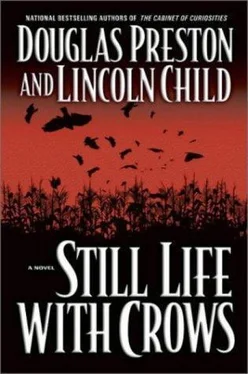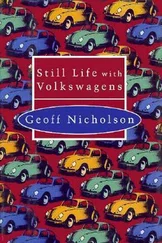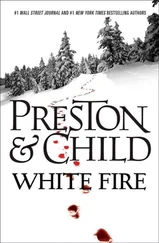Douglas Preston - Still Life With Crows
Здесь есть возможность читать онлайн «Douglas Preston - Still Life With Crows» весь текст электронной книги совершенно бесплатно (целиком полную версию без сокращений). В некоторых случаях можно слушать аудио, скачать через торрент в формате fb2 и присутствует краткое содержание. Жанр: Триллер, на английском языке. Описание произведения, (предисловие) а так же отзывы посетителей доступны на портале библиотеки ЛибКат.
- Название:Still Life With Crows
- Автор:
- Жанр:
- Год:неизвестен
- ISBN:нет данных
- Рейтинг книги:5 / 5. Голосов: 1
-
Избранное:Добавить в избранное
- Отзывы:
-
Ваша оценка:
- 100
- 1
- 2
- 3
- 4
- 5
Still Life With Crows: краткое содержание, описание и аннотация
Предлагаем к чтению аннотацию, описание, краткое содержание или предисловие (зависит от того, что написал сам автор книги «Still Life With Crows»). Если вы не нашли необходимую информацию о книге — напишите в комментариях, мы постараемся отыскать её.
Still Life With Crows — читать онлайн бесплатно полную книгу (весь текст) целиком
Ниже представлен текст книги, разбитый по страницам. Система сохранения места последней прочитанной страницы, позволяет с удобством читать онлайн бесплатно книгу «Still Life With Crows», без необходимости каждый раз заново искать на чём Вы остановились. Поставьте закладку, и сможете в любой момент перейти на страницу, на которой закончили чтение.
Интервал:
Закладка:
“In other words, he died of fright.”
The doctor glanced over at a male nurse who was emerging from the room, wheeling a stretcher. Gasparilla’s body was now wrapped head to toe in white and bound tightly with canvas straps. The doctor blinked, passed the back of a sleeve across his forehead. He watched the body disappear through a set of double doors.
“That’s a rather melodramatic way of putting it, but yes, that’s about it,” he said.
Twenty-Seven
S everal hours later, and two thousand miles to the east, the setting sun burnished the Hudson River to a rich bronze. Beneath the great shadow of the George Washington Bridge, a barge moved ponderously upriver. A little farther south, two sailboats, small as toys, barely broke the placid surface as they sailed on a reach toward Upper New York Bay.
Above the steep escarpment of Manhattan bedrock that formed Riverside Park, the boulevard named Riverside Drive commanded an excellent view of the river. But the four-story Beaux Arts mansion that stretched along the drive’s east side between 137th and 138th Streets had been sightless for many years. The slates of its mansard roof were cracked and loose. No lights showed from its leaded windows; no vehicles stood beneath its once-elegant porte cochère. The house sat, brooding and still, beneath untended sumacs and oaks.
And yet—in the vast honeycomb of chambers that stretched out like hollow roots beneath the house—something was stirring.
In the vaults of endless stone, perfumed with dust and other subtler, more exotic smells, a strange-looking figure moved. He was thin, almost cadaverously so, with leonine white shoulder-length hair and matching white eyebrows. He wore a white lab coat, from whose pocket protruded a black felt marker, a pair of library scissors, and a glue pencil. A clipboard was snugged beneath one narrow elbow. Atop his head, a miner’s helmet threw a beam of yellow light onto the humid stonework and rows of rich wooden cabinetry.
Now the figure stopped before a row of tall oaken cabinets, each containing dozens of thin, deep drawers. The man ran a finger down the rows of labels, the elegant copperplate script now faded and barely legible. The finger stopped on one label, tapped thoughtfully at its brass enclosure. Then the man gingerly pulled the drawer open. Rank upon rank of luna moths, pale green in the glow of the torch, greeted his gaze: the rare jade-colored mutation found only in Kashmir. Stepping back, he jotted some notes onto the clipboard. Then he closed the drawer and opened the one beneath it. Inside, pinned with achingly regular precision to the tack boards beneath, were a dozen rows of large indigo moths. Upon their backs, the strange silvery imprint of a lidless eye stared up from the display case. Lachrymosa codriceptes, wingèd death, the intensely beautiful, intensely poisonous butterfly of the Yucatan.
The man made another notation on his clipboard. Then he closed the second drawer and made his way back through several chambers, separated from each other by heavy cloth tapestries, to a vault full of glass cabinets. In the center, upon a stone table, a laptop computer glowed. The man approached it, set down the clipboard, and began to type.
For several minutes, the only sound was the tapping of the keys, the occasional distant drip of water. And then a strident buzzing suddenly erupted from the breast of his lab coat.
The man stopped typing, reached into his pocket, and removed the ringing cell phone.
Only two people in the world knew he had a cell phone, and only one person had the number. The man lifted the phone, spoke into it: “Special Agent Pendergast, I believe.”
“Precisely,” came the voice on the other end of the line. “And how are you, Wren?”
“Ask for me tomorrow, and you shall find me a grave man.”
“That I sincerely doubt. Have you completed your catalogue raisonné of the first-floor library?”
“No. I’m saving that for last.” There was an undisguised shudder of relish in the voice. “I’m still assembling a list of the basement artifacts.”
“Indeed?”
“Yes, indeed, hypocrite lecteur. And I expect to be at it several more days, at least. The collections of your great-grand-uncle were, shall we say, extensive? Besides, I can only be here during the days. My nights are reserved for the library. Nothing interferes with my work there.”
“Naturally. And you’ve heeded my warning not to proceed into the final chambers beyond the abandoned laboratory?”
“I have.”
“Good. Any surprises of particular interest?”
“Oh, many, many. But those can wait. I think.”
“You think? Please explain.”
Wren hesitated briefly in a way that his friends—had he any—would have called uncharacteristic. “I’m not sure, exactly.” He paused again, looked briefly over his shoulder. “You know that I’m no stranger to darkness and decay. But on several occasions, during my work down here, I’ve had an unusual feeling. A most disagreeable feeling. A feeling as if”—he lowered his voice—“as if I’m being watched. ”
“I’m not particularly surprised to hear it,” Pendergast said after a moment. “I fear even the least imaginative person on earth would find that particular cabinet of curiosities an unsettling place. Perhaps I was wrong to ask you to take on this assignment.”
“Oh, no! ” Wren said excitedly. “No, no, no! I would never forgo such a chance. I shouldn’t even have mentioned it. Imagination, imagination, as you say. ‘One sees more devils than vast hell can hold; such tricks hath strong imagination.’ No doubt it’s simply my knowledge of the, ahem, things these walls have borne witness to.”
“No doubt. The events of last fall have yet to release their hold on my own thoughts. I’d hoped that this trip would in some measure drive them away.”
“Without success?” Now Wren chuckled. “Not surprising, given your notion of getting away from it all: investigating serial murders. And from what I understand, such a strange set of murders, too. In fact, they’re so unusual as to seem almost familiar. Your brother isn’t vacationing in Kansas, by any chance?”
For a moment there was no answer. When Pendergast spoke again, his voice was chill, distant. “I have told you, Wren, never to speak of my family.”
“Of course, of course,” Wren replied quickly.
“I’m calling with a request.” Pendergast’s tone became brisk and businesslike. “I need you to locate an article for me, Wren.”
Wren sighed.
“It’s a handwritten journal by one Isaiah Draper, entitled An Account of the Dodge Forty-Fives. My research indicates that this journal became part of Thomas Van Dyke Selden’s collection, acquired on his tour through Kansas, Oklahoma, and Texas in 1933. I understand this collection is now held by the New York Public Library.”
Wren scowled. “The Selden Collection is the most riotous, disorganized aggregation of ephemera ever assembled. Sixty packing cases, occupying two storage rooms, and all utterly worthless.”
“Not all. I need details that only this journal can provide.”
“What for? What light could an old journal shed on these murders?”
There was no answer, and Wren sighed again.
“What does this journal look like?”
“Alas, I can’t say.”
“Any identifying marks?”
“Unknown.”
“Just how quickly do you need it?”
“The day after tomorrow, if possible. Monday.”
“Surely you jest, hypocrite lecteur. My days are taken up here, and my nights . . . well, you know my work. So many damaged books, so little time. Finding a specific item in that hurricane of—”
Читать дальшеИнтервал:
Закладка:
Похожие книги на «Still Life With Crows»
Представляем Вашему вниманию похожие книги на «Still Life With Crows» списком для выбора. Мы отобрали схожую по названию и смыслу литературу в надежде предоставить читателям больше вариантов отыскать новые, интересные, ещё непрочитанные произведения.
Обсуждение, отзывы о книге «Still Life With Crows» и просто собственные мнения читателей. Оставьте ваши комментарии, напишите, что Вы думаете о произведении, его смысле или главных героях. Укажите что конкретно понравилось, а что нет, и почему Вы так считаете.












